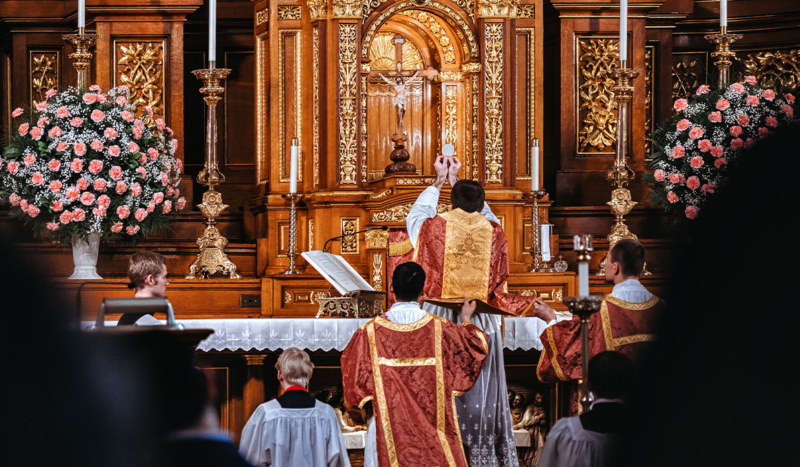
Photo by Alison Girone
Holy See Press Office Director Matteo Bruni said July 3 that he is not confirming whether a recent alleged Vatican questionnaire report about the Latin Mass is genuine and that the text “is part of one of the documents” that led to Pope Francis’ decision to further restrict the Latin Mass in 2021.
Catholic News Agency Vatican correspondent Hannah Brockhaus asked Bruni for official confirmation of the authenticity of the texts during a July 3 press conference, which was held to present a new formulary for a Mass for the care of creation, inspired by Pope Francis’ encyclical Laudato si.
“I am not confirming the genuineness of the texts that have been published,” Bruni said. “This is part of one of the documents on which the decision [to publish Traditionis Custodes] was based, and this of course is very incomplete and a partial reconstruction. Now the consultation that has just been mentioned was then supported by other documentation and other reports and further consultations that the Dicastery of the Doctrine of the Faith has received. But I won’t add anything else because this has nothing to do with today’s press conference.”
Bruni’s remarks come two days after Vatican-based journalist Diane Montagna reported that she obtained several parts of a Vatican report about the world’s bishops’ responses to a questionnaire regarding the Latin Mass and the faithful. Pope Francis, in issuing the apostolic letter Traditionis Custodes in 2021, told bishops in an accompanying letter that the questionnaire “responses reveal a situation that preoccupies and saddens me, and persuades me of the need to intervene.”
According to Montagna, the report she obtained reveals that a majority of the world’s bishops were against changing the current provisions regarding the celebration of the Traditional Latin Mass, though some had concerns and negative feedback on it.
The Congregation of the Doctrine of the Faith (CDF, now the Dicastery for the Doctrine of the Faith) conducted the questionnaire at the request of Pope Francis and compiled a report on their responses. Montagna reported July 1 that she had obtained the five-page excerpt of the Vatican’s overall assessment of the bishops’ responses about the implementation of Pope Benedict XVI’s apostolic letter Summorum Pontificum about the Latin Mass.
>> Vatican correspondent reports ‘major cracks’ in basis of Traditionis Custodes <<
The document reports that the majority of bishops said in the questionnaire were satisfied with the implementation of Summorum Pontificum and “that making legislative changes to the MP Summorum Pontificum would cause more harm than good. Any change — whether by suppressing or weakening the MP Summorum Pontificum — would seriously damage the life of the Church, as it would recreate the tensions that the document had helped to resolve.”
In the article about the documents, Montagna reflected that the assessment “reveals is that the ‘gaps’, ‘divergences’, and ‘disagreements’ stem more from a level of nescience, prejudice and resistance of a minority of bishops to Summorum Pontificum than from any problems originating from adherents to the traditional Roman liturgy.”
In reaction to Montagna’s report, Joseph Shaw of the Latin Mass Society of England and Wales commented to The Associated Press’s Rome correspondent Nicole Winfield that Pope Leo XIV should address the situation “urgently.”
Winfield wrote, “One way Leo can do so is by merely instructing the Vatican to more freely grant exemptions to bishops to allow Latin Masses to be celebrated in diocesan parishes. Such permission was recently granted to the diocese of San Angelo, Texas, according to the Rev. Ryan Rojo, the diocesan seminarian director,” who said the Vatican gave a two-year permission extension.
